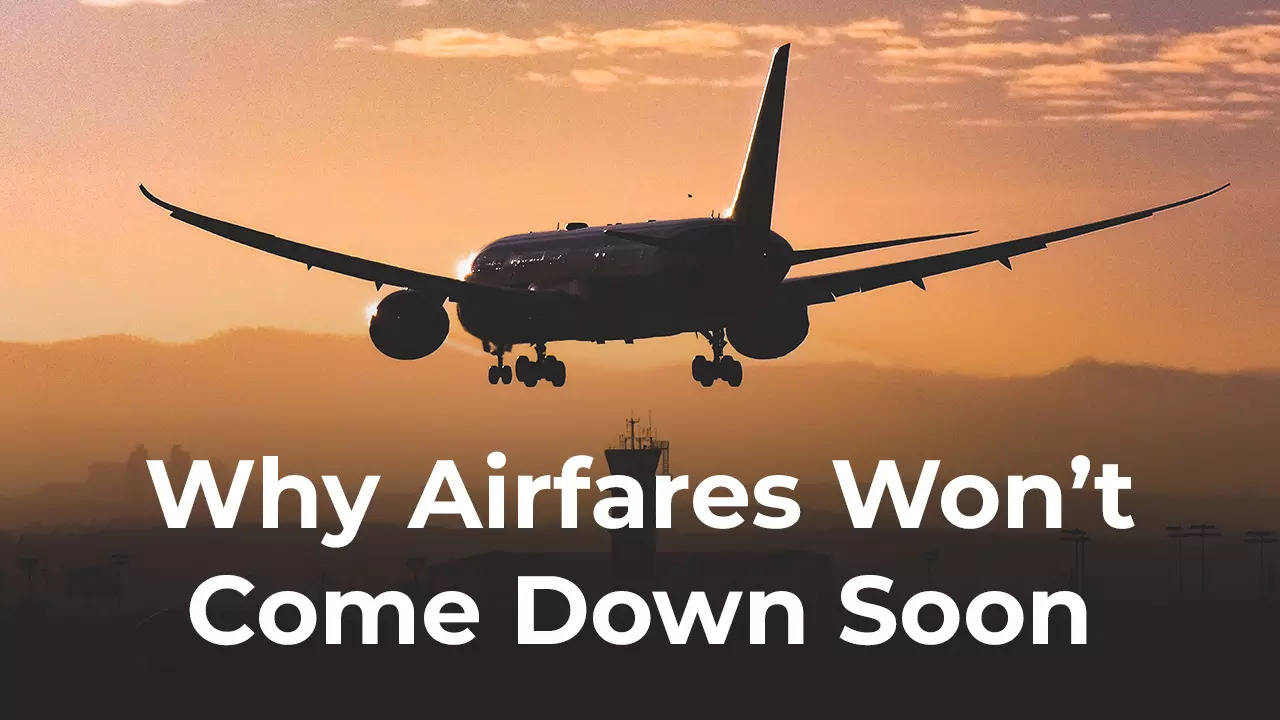Aviation industry experts and airline executives have expressed their skepticism regarding the impact of any move by the aviation regulator to control airfares. The recent recommendation by a parliamentary panel to implement measures to curb high fares is unlikely to affect rates in the current free market system.
Due to significant capacity reductions, air ticket prices are expected to further increase, according to an ET report quoting industry experts. IndiGo, the largest airline in the country, has already grounded 74 planes until December. Other airlines such as Go First, SpiceJet, Air India group, and Vistara have also grounded 90 planes.
Industry executives predict that the total number of grounded aircraft will rise to 200 in the coming months, up from 164 at the end of December.
Despite the addition of 150 planes in 2024, a 34% increase from the previous year, it is still insufficient to meet the ever-growing demand for air travel. Domestic air traffic in India witnessed a 24% year-on-year growth, reaching 152 million passengers in 2023, according to the Directorate General of Civil Aviation (DGCA).
Also Read | ‘Make in India’ boost! Airbus awards contract to Dynamatic Technologies for manufacturing A220 aircraft doors
Kapil Kaul, the CEO of aviation consultancy CAPA India, acknowledged the concerns regarding high prices. However, he emphasized the need for a robust and independent institutional framework in India to address consumer and competition-related issues, similar to the civil aviation authority in the UK. Kaul stated that the involvement of the DGCA in airline pricing would have little impact and urged the establishment of a more comprehensive solution.
Kaul attributed the rise in fares to a mismatch between supply and demand caused by a significant capacity shortage. He noted that prior to the past 12-18 months, India had the lowest airfares globally, and the current rate structure is a consequence of the grounded planes.
While cautioning against arbitrary fare hikes, Aviation Minister Jyotiraditya Scindia recently stated that the government does not intend to regulate ticket prices. An industry executive supported this approach, stating that apart from exceptional circumstances such as the Covid pandemic, airfares are primarily determined by supply and demand. The current and anticipated surge in fares can be attributed to the reduction in capacity resulting from grounded planes.
Also Read | Have summer travel plans? Why fliers should book flight tickets now to get best price deals
The industry insider, who chose to remain anonymous, revealed that airfares booked 15-30 days in advance in January 2024 are only marginally different from those in January 2023. In fact, prices have slightly decreased on the busy Delhi-Mumbai route.
In a recent report, the parliamentary standing committee on transport, tourism, and culture recommended the establishment of a separate entity under the aviation ministry to regulate air ticket prices, not only during disasters but also during normal times. The committee emphasized the importance of passengers receiving fair treatment at all times and highlighted the need for price controls, especially during holidays and festival seasons.
Due to significant capacity reductions, air ticket prices are expected to further increase, according to an ET report quoting industry experts. IndiGo, the largest airline in the country, has already grounded 74 planes until December. Other airlines such as Go First, SpiceJet, Air India group, and Vistara have also grounded 90 planes.
Industry executives predict that the total number of grounded aircraft will rise to 200 in the coming months, up from 164 at the end of December.
Despite the addition of 150 planes in 2024, a 34% increase from the previous year, it is still insufficient to meet the ever-growing demand for air travel. Domestic air traffic in India witnessed a 24% year-on-year growth, reaching 152 million passengers in 2023, according to the Directorate General of Civil Aviation (DGCA).
Also Read | ‘Make in India’ boost! Airbus awards contract to Dynamatic Technologies for manufacturing A220 aircraft doors
Kapil Kaul, the CEO of aviation consultancy CAPA India, acknowledged the concerns regarding high prices. However, he emphasized the need for a robust and independent institutional framework in India to address consumer and competition-related issues, similar to the civil aviation authority in the UK. Kaul stated that the involvement of the DGCA in airline pricing would have little impact and urged the establishment of a more comprehensive solution.
Kaul attributed the rise in fares to a mismatch between supply and demand caused by a significant capacity shortage. He noted that prior to the past 12-18 months, India had the lowest airfares globally, and the current rate structure is a consequence of the grounded planes.
While cautioning against arbitrary fare hikes, Aviation Minister Jyotiraditya Scindia recently stated that the government does not intend to regulate ticket prices. An industry executive supported this approach, stating that apart from exceptional circumstances such as the Covid pandemic, airfares are primarily determined by supply and demand. The current and anticipated surge in fares can be attributed to the reduction in capacity resulting from grounded planes.
Also Read | Have summer travel plans? Why fliers should book flight tickets now to get best price deals
The industry insider, who chose to remain anonymous, revealed that airfares booked 15-30 days in advance in January 2024 are only marginally different from those in January 2023. In fact, prices have slightly decreased on the busy Delhi-Mumbai route.
In a recent report, the parliamentary standing committee on transport, tourism, and culture recommended the establishment of a separate entity under the aviation ministry to regulate air ticket prices, not only during disasters but also during normal times. The committee emphasized the importance of passengers receiving fair treatment at all times and highlighted the need for price controls, especially during holidays and festival seasons.































